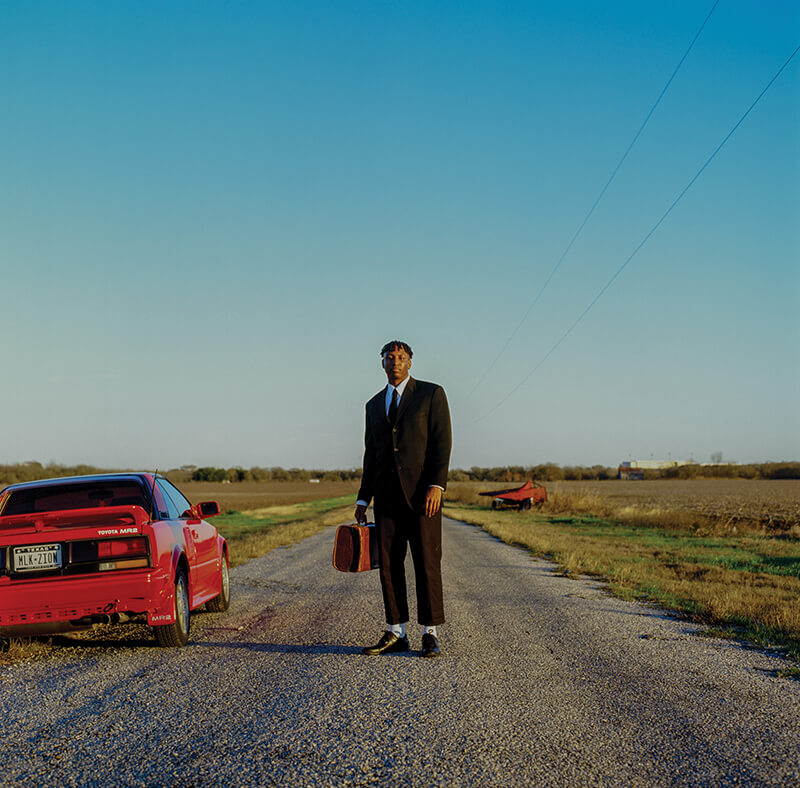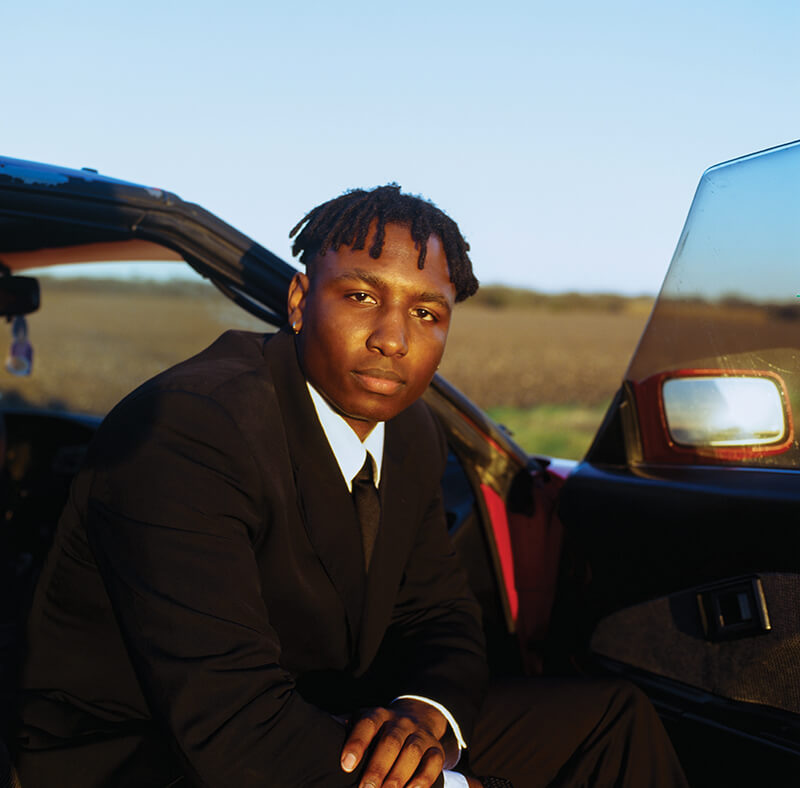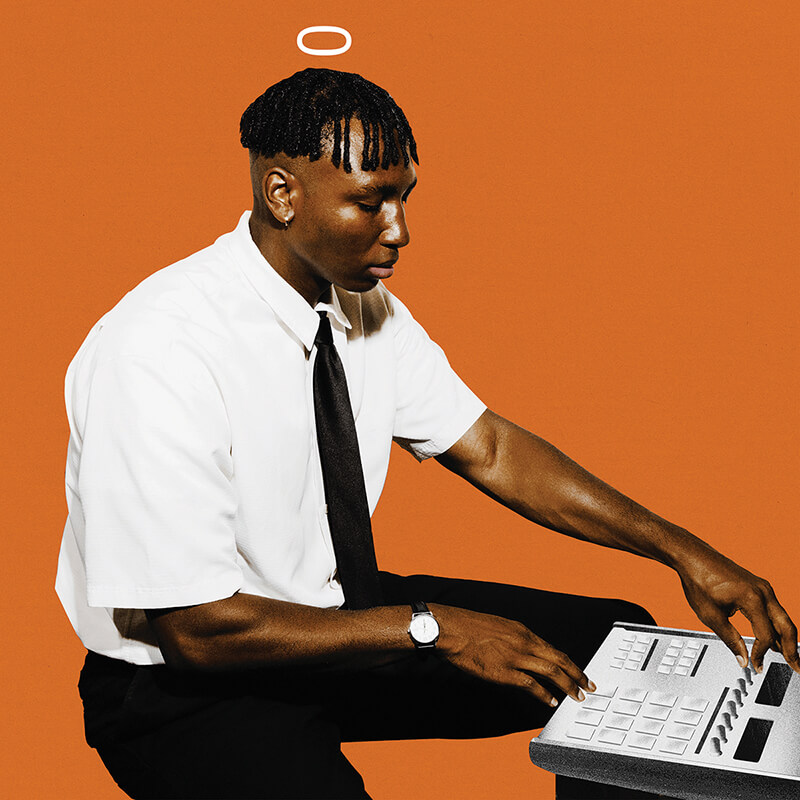You’re driving home just as the sun is setting and you feel compelled to pull over because the sun is creating the most magnificent sky, filled with the entire spectrum of colors. Something as simple as paying attention became the inspiration for MALIK’s latest endeavor: a seven-single series called Spectrum. MALIK is a rising vocalist and producer and is Grammy-accredited for his work on Ariana Grande’s “Better Off.” We got to catch up with MALIK to discuss his latest work and his personal journey finding his expression through music.
What were some of the first inspirations that got you into music and producing?
My family and parents. They were always playing music around the house and that was my first introduction to music, but I didn’t really get into [it] until I was nine or ten. I’m walking around Walmart with my mom during Christmas and I see a guitar and I’m like, ‘Oh, that looks cool, I want a guitar for Christmas.’ My mom got me the guitar along with lessons, and from then on, I realized I can create, I can make things, I can write songs, I can express myself.
That made me fall in love with the idea of songwriting. And from there, one day my dad came home with a video game called Funkmaster Flex’s Digital Hitz Factory and it was this game from PlayStation 2 where you can make beats. That was mind-blowing to me that you could do that, which was what got me into production and was basically the foundation for everything. It eventually got to a point where I built up enough skills and put so much time into it that I finally got to a point of expressing myself the way I want to.
What was it that drew you so early on to a love of creating and finding a form of expression?
Both my parents are creatives themselves…I’ve always just loved to create. I used to draw pictures of shoes and outfits and things I would someday make; my mom used to call me a pack rat because I used to collect shiny little things and try to make little inventions, I would call them. But I’ve always had this love to create and I think when I got my hands on a guitar… it was just a great entry point for me to create something close to what I love. You know, the gap between drawing the shoe and wearing the shoe, especially at that age is a pretty big gap, but that I can literally sit here and make sounds and write songs that felt close to the things I was hearing my parents play, was really inspiring.
You mentioned how the slow grind for you was all the hours you’ve spent alone honing your production skills and creating music. Taking a look at your journey holistically, how did you find your voice and arrive at the point where you felt confident about expressing yourself in this medium?
I think the cool thing for me was, I got into music and started writing songs purely as a form of dealing with emotions and expressing myself. So, while of course, I definitely wanted people to hear my songs and like them, it was still, for me like, ‘Man, I’m at school, kids are making fun of me, this girl doesn’t like me back, how am I going to process this?’ And I would go home and write poetry and write songs and it would just help me feel better.

It never felt like I’m putting all this work in to make music or build up this skill. For me, it was really my safe space, to feel fully me. And then the more you learn about yourself, the more that influences your art, and your art becomes more of you, and more of your voice…Of course, you’re going to pick things up and have influences, but you find your way of expressing your full unique expression.
Let’s talk about you getting to this point in your career: signing to the ARTium label, how your professional relationship with No I.D. developed, and diving into the music industry — how has it shaped you as an artist?
Oh, man, for sure, I met No I.D. through this production company I used to be signed to, they managed J.I.D. and Earthgang. But basically, J.I.D. had a session with No I.D. and I was working and producing for his project, so I was in the studio. There was a little break in the session, and I was playing some music for No I.D. and was really enjoying the music. So, from there we started loosely working on stuff, you know, maybe he would send me little ideas and I’d finish them kind of thing. Then we reconnected at the Dreamville Sessions and we got a chance to work in the same room, live setting situation and that’s when he said we should work together.
So, from there he flew me to LA and I worked out of the studio for several months straight. And that’s when we really built a relationship. Just the conversations we have about life, or business, or spirituality, or things I never experienced in the music industry, it really felt like I found someone I want as a part of my life, even if I didn’t do music. He’s truly, truly a mentor in every sense of the word.
So, what was it like to jump from learning and creating music by yourself to collaborating with other amazing musicians?
It’s honestly been amazing. I think it’s a skill that I’m refining because ultimately, I know all the art that I hold in the highest regard has a lot of people involved. As far as the art of collaboration, it is probably the most important thing I would say after you have your own self-identity. Just seeing other people’s processes and people having a different perspective than you, is really really dope. And it really takes a lot of the pressure off of doing everything yourself. It’s honestly just been me learning from everyone I’ve worked with and trying to pull things that I can apply to my own art.

I like how you mentioned, “after you have your own self-identity.” Do you think that’s important for you to develop before delving into the collaborative process?
Absolutely, because I think… there are so many things accessible to us today that it’s very easy to sway wherever the wind blows, but once you have your nucleus set, then you can start bringing in the right things. Because you may not know what you need yet, you’re still exploring, and you don’t want to lose yourself in the world…
Let’s talk about your album Spectrum and what your inspiration was for the color motif.
I had just finished a project, the whole album kind of deal, and I was really, really…tired. I put together this whole cohesive album, I did all the album artwork, I did all the marketing and promotion myself, and I was just really exhausted. So, I wanted to do something without the pressure of needing to make something completely cohesive, thinking about the transitions, and things like that. Then I was driving home from work one day in the evening and I look at the sky and the sun was just setting, and you could see the whole color spectrum across the sky, and it was just beautiful. So, I took a picture, wrote down the word ‘spectrum’ and thought, ‘One day that’s going to be something.’
Several months go by and I felt it was time for me to work on something, music without the pressure of anything. For me, every color in Spectrum is a different emotion that I’m exploring and learning how to process in a healthy way. I want to feel everything and then allow it to pass through me without holding on to anything, but also without the fear of feeling it first.

I like that you didn’t give yourself any pressure in your exploration with this album, so what do you feel you’ve learned as an artist from this project?
Timing. Patience. I think that has probably been the toughest thing for me to learn because I want to do so many things, and I want to do so many things right now. But if the timing isn’t right, it isn’t going to be what you want it to be, or it isn’t going to reach its full potential if you’re impatient and start rushing things. I’m really thankful that the timing was right for this project.
And also, being comfortable with being uncomfortable sometimes. And kind of sitting in those thoughts of, ‘You know, I’m not where I want to be’ or ‘kind of going through something right now,’ but to be okay with that process and not check out. Because that’s what’s building your strength and your resolve to endure those low moments. Kind of, holding on to what you believed in from the beginning, and although you may not see the light at the end tunnel this very second, doesn’t mean it’s not there.
What do you want your fans to take away from Spectrum?
I want people to learn how to love themselves completely and to accept every gift that they have and every flaw that they have, so that they can recognize that as a starting point to grow, and refine, and to move forward.
I love that. So, what are you currently working on that we can look forward to?
I’m in the beginning stages of kind of working on a little spin-off of Spectrum. I don’t have a title I’m ready to announce just yet, but I want to open up the world to collaboration. So, it’s kind of like a little spin-off universe where other people are a part of it.
